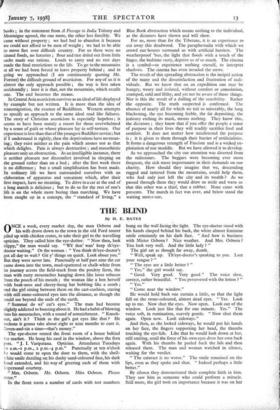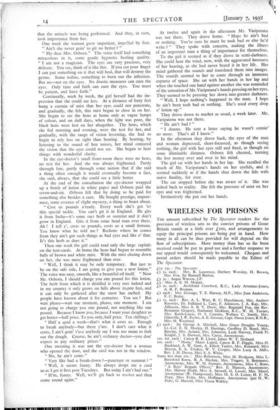THE BLIND
By H. E. BATES
ONCE a week, every market day, the man Osborn and his wife drove down to the town in the old Ford tourer piled up with chicken crates, to take their girl to the travelling optician. They called him the eye-doctor. " Now then, look slippy," the man would say. " We don' wan' keep th'eye- doctor waiting." Or the woman : " You think th'eye-doctor's got all day to wait? Git y' things on quick. Look about you." But they were never late. Punctually at half past nine the car came down into the town, mud-spattered or chalk-white from its journey across the field-track from the poultry farm, the man with rusty moustaches hanging down like loose tobacco from the pouch of his mouth ; the woman like a hen herself with beak-nose and cherry-hung hat bobbing like a comb ; and the girl sitting between them on the cart-cushion, staring with still stone-coloured eyes into the distance, as though she could see beyond the ends of the earth.
:` Summat do wi' cat's eyes." The man had become slightly addicted to boasting about it. He had a habit of blowing into his moustaches, with a sound of astonishment. " Knock- out, ain't it ? Think as the gal's got eyes like that ? He reckons it gonna take about eight or nine months to cure it. Seven-and-six a time—that's money."
The eye-doctor rented the front room of a house behind the market. He hung his card in the window, above the fern pots. " J. I. Varipatana. Optician. Attendance Tuesdays To p.m., 2 p.m.-4 p.m." Punctually at ten o'clock he would come to open the door to them, with the shell- white smile dazzling on his dusky sand-coloured face, his dark hand extended, and his way of greeting each of them with impersonal courtesy.
" Mrs. Osborn. Mr. Osborn. Miss Osborn. Please enter."
In the front room a number of cards with test numbers hung on the wall facing the light. The eye-doctor stood with his hands clasped behind his back, the white almost feminine smile constantly on his dark face. " And how is business with Mister Osborn ? Nice weather. And Mrs. Osborn ? You look very well. And the little lady ? "
The girl sat as though far away, dumb.
" Well, speak up. Th'eye-doctor's speaking to you. Lost your tongue ? "
" The eyes are a little better ? "
" Yes," the girl would say.
" Good. Very good. Very good." The voice slow, correct, rather beautiful. " You persevered with the lotion ? " CC yes!, " Come near the window."
He would hold back one curtain a little, so that the light fell on the stone-coloured, almost dead eyes. " Yes. Look up to me. Now shut the eyes. Now open. Look out of the window. Look just like that for one minute. Yes." The voice soft, in rumination, suavely gentle. " Now shut them again. Open now. Look sideways."
And then, as she looked sideways, he would put his hands on her face, the fingers supporting her head, the thumbs touching the eye-lids. Like that he would look down at her, still smiling, until the force of his own eyes drew her own back again. With his thumbs he peeled back the lids and then released them. The man and woman watched in silence, waiting for the verdict.
" The cataract is no worse." The smile remained on the lips, even as they spoke and shut. " Indeed perhaps a little better."
By silence they demonstrated their complete faith in him. They saw him as someone who could perform a miracle. Still more, the girl took on importance because it was on her that the miracle was being performed. And they, in turn, took importance from her.
One week the woman grew impatient, impelled by fear. " Ain't she never goin' to git no better ? "
" My dear Mrs. Osborn." The voice itself had something miraculous in it, some gentle hypnotic healing quality. " I am not a magician. The eyes are very precious, very delicate. You see, think of it like this. If you cut your finger I can put something on it that will heal, that will destroy the germs. Some iodine, something to burn out the infection. But no—not on the eyes. No drastic measures can cure the eyes. Only time and faith can cure the eyes. You must be patient, and have faith."
Continually, week by week, the girl herself had the im- pression that she could see less. At a distance of forty feet hung a curtain of mist that her eyes could not penetrate, and gradually, she felt, this mist began to close in on her. She began to see the hens at home only as vague lumps of colour, and on dull days, when the light was poor, the black hens were lost on her altogether. The hens, which she fed morning and evening, were the test for her, and gradually, with the range of vision lessening, she had to begin to rely less on sight than hearing. By hearing, by listening to the sound of hen noises, her mind conjured the vision that the eyes could not see. She began to hear things with wonderful clarity.
In the eye-doctor's small front-room there were no hens, no test for her. And she was always frightened. Partly through fear, partly through some notion that if she said a thing often enough it would eventually become a fact, she said, always, that she could see a little better.
At the end of the consultation the eye-doctor wrapped up a bottle of lotion in white paper and Osborn paid the seven-and-six. Osborn felt that by doing so he paid for something else besides a cure. He bought prestige, import- ance, some essence of slight mystery, a thing to boast about.
" Cost us pounds a'ready. Every week she's got 'ev this special tackle. You can't git it in England. He gits it from India-r-it's some rare herb or summat and it don't grow in England. Gits it from some head man over there. Ah ! I tell y', costs us pounds, costs us a small fortune. You know what he told me ? Reckons where he comes from they ain't got such things as bad eyes and like o' that. It's this herb as does it."
Then one week the girl could read only the large capitals on the text-cards. At home .the hens had begun to resemble balls of brown and white mist. With the mist closing down on her, she was more frightened than ever.
" Well, I think it may be only temporary. But just to be on the safe side, I am going to give you a new lotion." The voice was easy, smooth, like a beautiful oil itself. " Now Mr. Osborn, I should charge you one pound for this lotion. The herb from which it is distilled is very rare indeed and in my country it only grows on hills above io,000 feet, and it can only be gathered after the snow has melted. My people have known about it for centuries. You see ? But wait please—wait one moment, please, one moment. I am not going to charge you one pound, not anything like one pound. Because I know you, because I want your daughter to get better—half price. To you only, half price. Ten shillings."
" Half a quid a week—that's what it costs us. Enough to break anybody—but there y'are. I don't care what it costs, I ain't goin' t'ave anybody say I was too mean to fork out the dough. Course, he ain't ordinary doctor—you don' expect to pay ordinary prices."
One morning it was not the eye-doctor but a woman who opened the door, and the card was not in the window. " No, he ain't come."
" Very like had a break-down ?—puncture or summat ? " " Well, it seems funny. He always drops me a card so as I get it first post Tuesdays. But today I ain't had one." " H'm, funny. Well, we'll git back to market and then come round again." At twelve and again in the afternoon Mr. Varipatana was not there. They drove home. " Hop. he ain't bad or nothing. You're sure he must be took bad or else he'd write ? " They spoke with concern, making the illness of an important man a thing of importance for themselves. To the girl it seemed as if they drove in semi-darkness. She could hear the wind, now, with the aggravated keenness of her hearing, as she had never heard it in her life. _ Her mind gathered the sounds and translated them into images. The sounds seemed to her to come through an immense expanse of space. She sat with her hands in her lap and when she touched one hand against another she was reminded of the sensation of Mr. Varipatana's hands pressing on her eyes. They seemed to be pressing her down into greater darkness. " Well, I hope nothing's happened to the man. I hope he ain't been took bad or nothing. She's used every drop o' lotion up." They drove down to market as usual, a week later. Mr. Varipatana was not there.
" He ain't bad ? "
" I dunno. He sent a letter saying he wasn't comin' no more. That's all I know."
In the afternoon they drove back, the eyes of the man and woman depressed, short-focussed, as though seeing nothing, the girl with her eyes still and fixed, as though on some illimitable distance. Osborn felt cheated, turning the lost money over and over in his mind.
The girl sat with her hands in her lap. She recalled the touch of Mr. Varipatana's hands on her eyelids, and it seemed suddenly as if the hands shut down the lids with suave finality, for ever.
The car stopped before she was aware of it. She was jerked back to reality. She felt the pressure of mist on her eyes and was frightened.
Instinctively she put out her hands.










































 Previous page
Previous page